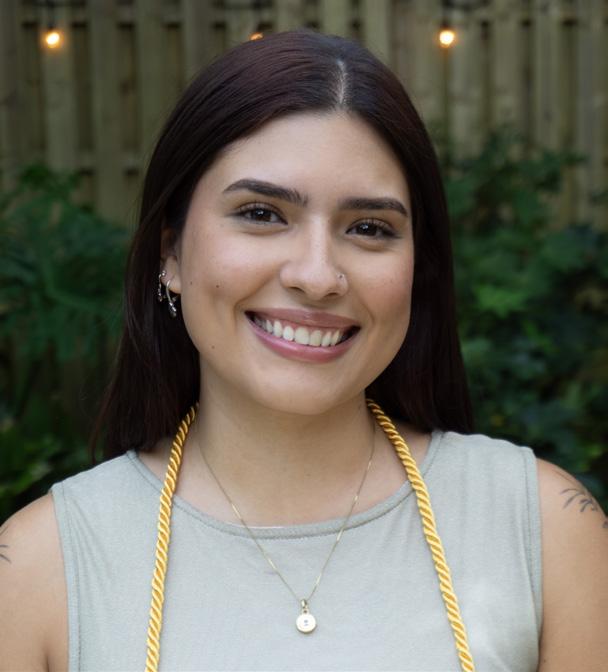
5 minute read
Adriana Sela connects research and policy in multifaceted academic path
Malas student maximized interdisciplinary opportunities across undergraduate, graduate, and professional experience
From the moment she applied to the MALAS program, Adriana Sela knew she wanted to pursue an internship. She had attended UF as an undergraduate during the COVID pandemic, shuttered in her dorm taking classes online, distanced from peers. “When I graduated, I just felt behind,” she shares. “I wanted extra experience beyond my studies, and I felt like I didn’t have it because the entire world stopped.”
As a result of this experience, Adriana knows the value of being in a room—most of all when the room is full of other students, mentors, professors, or professionals from whom she can learn. But securing an internship in the narrow window of time for a master’s degree is tricky, especially in the competitive world of international policy research and analysis, Adriana’s preferred field. So, where most students would pursue an internship in lieu of a thesis, she found herself in the unique position of conducting research and writing a 150-page thesis as a back-up plan.
Although she hadn’t yet secured an internship, Adriana was still working as a research assistant at the Florida Policy Institute, where she aided a team advocating for increased protections within child labor bills proposed by the Florida legislature. Here, she drew inspiration for her thesis, titled “‘Tuve Que Trabajar’/‘I Had to Work’: Understanding the Work Experiences of Latin American and Caribbean Immigrant Minors in Florida.” As she continued applications and interviews for internships, she went forward with her fieldwork.
For her thesis, Adriana conducted interviews with immigrant youths in South Florida and Gainesville, ranging from 18 to 24 years old. “It was important to me to highlight their experiences with work, because they’re a vulnerable population and work is exploitative,” she explains. Her role at the Florida Policy Institute put her in the unique position of hearing two distinct perspectives, miles apart. “I would listen to lawmakers talk about the value of work for young people, and then hear from these teenagers that had to choose between working and going to school because their family needed money. Those are the narratives that don’t necessarily make it onto the floor in Tallahassee.”
In the spring, with her thesis nearly written, Adriana finally got the opportunity she’d been working toward: she’d landed an internship with the prestigious Brookings Institution, a nonprofit organization conducting nonpartisan research for policymaking. She was placed on the 17 Rooms project, an experimental initiative designed to innovate solutions for the United Nations’ 17 Sustainable Development Goals (SDGs). Finally, Adriana was not only in the room—she was in 17 of them, with the opportunity to observe and support a multidisciplinary group of specialists tackling cooperative problem-solving on a global scale.
Not only that, but her internship tasked her with a research assignment that diversified her knowledge base even further: how can artificial intelligence be used to support organizations like Brookings? With little background information on the topic, Adriana set about investigating possible applications to improve workflows, assessments, reporting, even recruitment. “It took me out of my comfort zone and it made me rethink my perceptions about AI,” she reflects. “There’s a lot of value in figuring out how AI can be used to boost social good.”
Over the course of her time at UF, Adriana has maximized every opportunity to soak up knowledge across her ever-expanding list of interests, not just through professional experience. Her course roster from six years of study resembles something like a mosaic of interdisciplinary topics across Latin American Studies. “Between undergrad and grad school, I probably have taken more LAS classes than any other student,” she laughs. Among her most memorable are classes on transnational migration, race in the Americas, political ecology, facilitation skills, and even law—the last of which she took alongside third-year law students.
But this hardly reflects a lack of focus; instead, it demonstrates the full spectrum of Adriana’s interests. Connecting research to policy remains a cornerstone of her academic and professional pursuits, focusing her far-reaching, interdisciplinary curiosities towards a purpose for public good. “Research is essential to policymaking,” she asserts. “Sometimes it helps us see what the consequences are of bad policymaking, but it also can paint a picture beyond narratives in the media, and use data and analysis to add value to arguments, or hone in on what’s good.”
With this north star guiding her, Adriana is graduating from the MALAS program with both a thesis and internship experience, and her career options open. “Right now, the avenue that I’m taking is policy analysis,” she says. “But I’d love to do something program-related eventually, like overseeing a development project. I’m always looking for Latin America, but if I get a more global opportunity, I’d be happy with that too.” Whether she winds up in policy research and analysis, labor law, conservation and development, or program management, Adriana has maximized the diverse opportunities available at UF and the Center to customize her own toolkit for multiple paths toward success.










